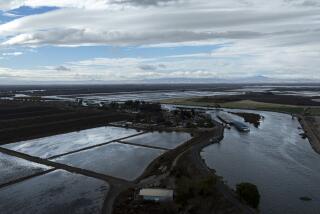Smelt ruling may cut into water supply
A federal judge late Friday ordered protective measures for a tiny endangered fish in the Sacramento-San Joaquin River Delta, a mandate state water officials warned could cut Northern California water exports to Southern California by a third or more.
Environmental lawyers disputed the officials’ draconian assessment of U.S. District Judge Oliver W. Wanger’s decision to protect the delta smelt, a creature that biologists say is facing extinction in large part because of increased pumping from the delta. The fish are weak swimmers and tend to be sucked into the water system’s massive pumps and killed.
Water officials said the judge’s decision could be the most significant ever on the state’s ability to deliver water through the delta, the key crossroads for the movement of water supplies to Southern California.
In a normal water year, they said, deliveries through the delta could be cut by up to 37% -- a loss of enough water to supply upward of 4 million households. Dry years could see smaller cuts, but there would be less water to begin with.
“It means there will be less water delivered than we normally do,” said Jerry Johns, deputy director of the state Department of Water Resources, which runs the giant California Aqueduct.
The decision comes in a suit filed by the Natural Resources Defense Council and Earthjustice against the Department of Interior and water agencies, among others.
Kate Poole, senior attorney for the Natural Resources Defense Council, questioned the officials’ numbers. “I don’t think they can say that,” she said. “I don’t think anybody has yet figured out how much delivery reduction this would cause.”
Poole said any decrease in water supplies would be “in the natural range of variability that water users can and do deal with all the time.”
Wanger ordered that water flows be maintained at sufficient levels to keep the endangered fish away from the pumps from the end of December, when they’re about to spawn, until June, when young fish are moving into areas with more food. A major way of maintaining the flow levels is reducing the amount of water being moved out of the delta.
With several water districts already eyeing the possibility of mandatory water rationing, the results for the Southern California economy could be significant, said Tim Quinn, executive director of the Assn. of California Water Agencies.
“A sober assessment says it’s a very large deal,” Quinn said. “Water agencies have to prepare for the worst.”
The Metropolitan Water District of Southern California, which provides drinking water to nearly 17 million people, obtains 60% of its water from the delta. The district has already warned local farmers to expect a 30% cutback Jan. 1.
In anticipation of a water shortage, the authority in recent years struck a deal for more Colorado River water from the water-rich Imperial Irrigation District, began planning for a seawater-to-fresh water project, and designed several storage improvements.
Concerns about the effect of the ruling reverberated in San Diego too. Fern Steiner, chairwoman of the San Diego County Water Authority, said the decision could require rationing.
The authority, which provides water to 24 local agencies, recently asked residents to reduce daily usage by 20 gallons per person. Authority General Manager Maureen Stapleton said it is time to begin serious negotiations about a canal that would loop around the delta.
“The plumbing is broken,” Stapleton said.
Though any restrictions created by the judge’s decision eventually would be replaced by a new biological opinion being fashioned by federal wildlife managers, Quinn said there is “no reason to believe a biological opinion will be any easier on water supplies.”
Gov. Arnold Schwarzenegger called the decision “further proof that our water system is broken, unreliable and in crisis” and “a devastating blow to our water system and state economy.”
Schwarzenegger cited his proposed $5.9-billion comprehensive water plan, which includes $1 billion for delta restoration and a new system for diverting water around the delta, as the sort of investment needed to guarantee supplies to the 25 million Californians who depend on delta water while also protecting its ecosystem.
Terry Erlewine, general manager of the State Water Contractors, said farmers in the San Joaquin Valley probably would be forced to leave fields unplanted and groundwater pumping would be increased to offset slashed water imports. Even if next winter yields average rainfall and snowpack, he said, users will have to tap water reserves, making the state even more vulnerable in a drought.
Michael Boccadoro, spokesman for the Coalition for a Sustainable Delta, a group of users who depend on delta water, said the decision means “the delta crisis is now a full-blown catastrophe. We have effectively relinquished control of our major water supply systems -- the lifeblood of our economy -- to the federal courts.”
Delta smelt, the subject of the court’s decision, grow to about 3 inches long and live only about a year. A so-called indicator species that is a harbinger of ecological conditions in the delta, the smelt were declared endangered in 1993. Since then, federal and state water managers occasionally have had to cut back on the amount of water released from the delta to protect the fish.
In June, water diversion was suspended entirely for nine days after unusually large numbers of smelt died in the pumps.
Biologists and environmentalists contend that the increasing diversion of delta water is nudging the fish toward extinction. A recent survey showed the number of juveniles to be less than one-tenth of normal -- a dire portent for the survival of the species.
Delta water exports in the last five years have been among the highest on record, according to state figures. Environmentalists have contended that the increase has had a direct effect on smelt numbers, which biologists say are at unprecedented lows.
In 2005, when a large number of the California Water Project’s 40-year contracts with its customers were coming due, water managers asked the U.S. Fish and Wildlife Service to determine what effect their plans would have on the tiny fish. In a biological opinion, the federal agency concluded that water operations in the delta did not jeopardize the smelt’s survival.
The finding brought howls of protest from environmentalists, who promptly sued in federal court. They said the biological opinion was part of a pattern of Bush administration environmental decisions that ignored sound science.
Wanger invalidated the biological opinion in May. He called the delta smelt “indisputably in jeopardy as to its survival and recovery,” and castigated the federal report as “arbitrary, capricious and contrary to law.”
When the nine-day shutdown of water exports in June was over, and the massive pumps were back in full operation, smelt fatalities rose dramatically. The Natural Resources Defense Council and the nonprofit environmental law firm Earthjustice asked Wanger to order state and U.S. officials to cut back the pumping immediately.
Wanger refused their request, instead convening the trial that led to Friday’s decision.
--
eric.bailey@latimes.com
Times staff writer Tony Perry contributed to this report.
More to Read
Start your day right
Sign up for Essential California for news, features and recommendations from the L.A. Times and beyond in your inbox six days a week.
You may occasionally receive promotional content from the Los Angeles Times.






